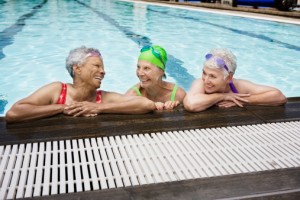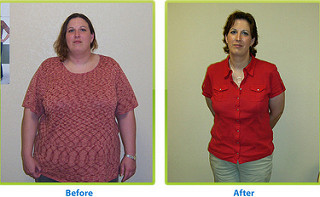Dieting VS. Exercise for Weight Loss
You know the drill. You join a gym, or a new hiking group, or buy a bicycle, or just get a dog (who needs walking several times a day) and you think, "Wow. I'll be burning more calories now by exercising, so maybe I can have that second slice of cheesecake at dinner tonight after all, and still achieve my weight loss goals." No need to apologize for thinking this ?we've all been there.
Sadly, it appears that we were all mistaken.
The consistent evidence of science tells us that exercise alone rarely helps a person to lose weight. Exercise can be very important and beneficial indeed in keeping us healthy, and in lowering our risk of contracting many diseases, but chances are it's not going to help us to lose any significant amounts of weight. The only thing that does work is consuming fewer calories.
The myth: exercise increases our metabolic rate and burns more calories
 The truth is sadly: NOT. Long-term research on successful dieters indicates that their basal metabolic rate decreases as they lose weight, even if they exercise religiously. Subjects who burned 500 calories a day in their exercise sessions wound up with a lower daily caloric burn than before they started exercising, and as a result lost less weight than expected.
The truth is sadly: NOT. Long-term research on successful dieters indicates that their basal metabolic rate decreases as they lose weight, even if they exercise religiously. Subjects who burned 500 calories a day in their exercise sessions wound up with a lower daily caloric burn than before they started exercising, and as a result lost less weight than expected.
In a fascinating recent study on the hunter-gatherer Hadza tribe of Tanzania, who normally walk many miles a day, researchers fitted them with GPS devices to track exactly how much they did walk, and at the same time measured their daily energy expenditure and metabolic rates. They found that although the Hadza people were far more active than average Americans, the number of calories they burned each day was about the same as the average American.
The conclusion reached by the researchers was that physical activity and exercise by themselves are not going to keep you thin or help you to lose weight, unless they are accompanied with a substantial reduction in caloric intake.
Want to lose weight? Consume fewer calories
It really seems to be as simple as that, for most people. The key to weight loss is ?still ?to burn more calories than you consume. However it looks as if increasing exercise is not the way to increase the "burn." The body just compensates for the increased activity, and your basal metabolic rate remains pretty much the same.
It's also easier to eliminate calories through diet than it is to try to eliminate them through exercise. Many studies have proven the psychology of this, showing that people are much more likely to be able to stick to lower-calorie diets than they are to be able to stick to regular exercise programs.
That said, reducing calories does not necessarily mean "dieting." The people most successful at losing weight and keeping it off don't go on "crash diets," and they don't watch every spoonful of what they eat. What they do instead is to eat healthier, and more wisely ?avoiding sugary drinks and snacks, eating more fruits, vegetables and whole grains, and including in their meals healthy amounts of lean meats and beneficial fats.
"Diet is about weight. Exercise is about health."
Those are the words of Dr. Robert Lustig, an endocrinologist who adds, "Is exercise good? Absolutely. But not because it burns calories." No one disputes that regular exercise is important for living a healthy life. There may be disputes about what types of exercise are best, and how much of it is actually needed, but everyone is pretty much agreed that it's a good thing. What doctors and nutritionists are admitting, however, given the recent body of research on the subject, is that exercise is not the key component in losing weight.
To "burn off" a pound of fat with exercise, you'd have to literally run a marathon. But to lose that pound of fat through dieting, all you'd have to do is reduce the size of the portions of food you eat, and choose more sensible foods. As Dr. Lustig says, "People should be paying more attention to what they put in their mouth than in their exercise plan."
Ideally, a combination of more sensible diet and exercise is the best for most people. Healthy lifestyle changes tend to complement each other, and research has shown that changes in dietary behavior help to promote changes in exercise behavior as well. So don't read this article and stop exercising. Instead, run those miles before dinner as you intended to, but don't "reward yourself" by eating more at dinner.
-
Could You Have Diabetes? Ask Your Dentist
Doctors are beginning to pay more attention to the strong conne
-
How To Rev Up Your Metabolism For Fat Burning Weight Loss
Put your metabolism to work for you. Nows the precise time to incorpor
-
Healthy And Quick Weight Loss - Stomach Shaping And Weight Loss
Almost all of the people agree that we would all be better off if we w
-
Fat Lady In A Thin Body WLS Patients Feel Like Imposters
Every weight loss surgery patient Ive met said they at sometime during
-
5 Foods You Need to Avoid Eating in the Morning for Weight Loss
A nutritious breakfast can set the tone for a healthy day, but it can
-
Weight Loss Workouts
Get workouts for weight loss sitting at home! Yes you heard us right.
- DON'T MISS
- How To Stay Away From Obesity With The Right Eating Habits
- Get Flat Abs Fast
- Does Exercise Really Help Lose Weight?
- Activity Shown To Be Less Important for Weight Loss Than Food
- Is Fasting Safe For Fast Weight Loss?
- Gaspari Supplements Company: A Brand That Continues To Evolve
- Weight Loss Product Warnings How To Spot Fat Burning Diets
- The Most Popular Cosmetic Surgery
- Lose Weight Naturally with 20 Natural and Easy Tips
- Multiple sclerosis vs. stroke, differences in symptoms, causes, and treatments




